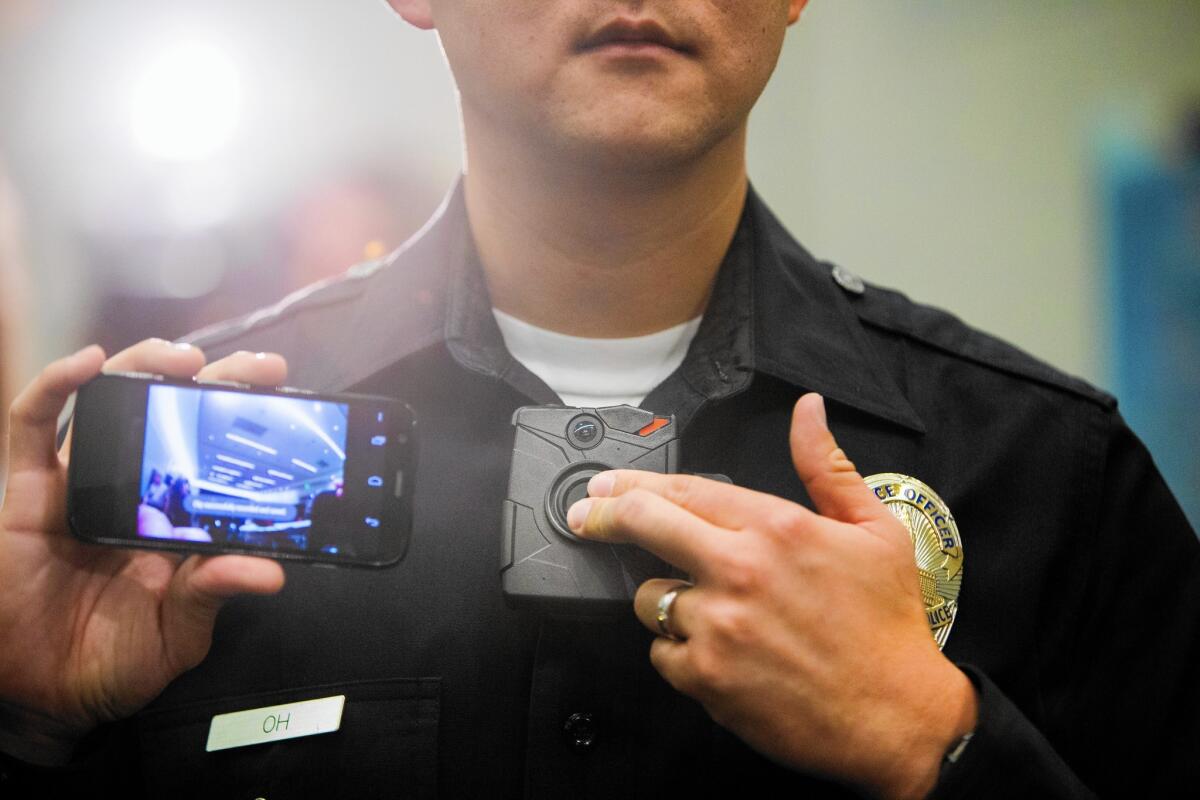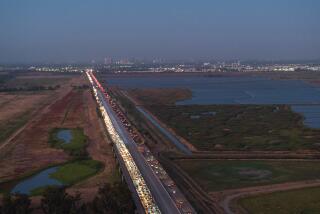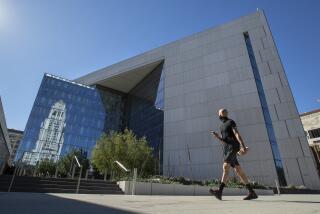A fight over access to video from LAPD body cameras is shaping up

LAPD Officer Jin Oh displays video from a body camera during a news conference on Dec. 16, 2014.
Ever since grainy images of Los Angeles police officers beating Rodney King were broadcast nearly 25 years ago, video recordings have come to be viewed by many as the ultimate evidence in cases of disputed police actions.
The Los Angeles Police Department is about to take this concept to a new level by outfitting every officer with a body camera that will record their interactions with the public. Officials say the 7,000 cameras will help bring clarity to controversial encounters, guard against officer misconduct and clear cops accused of wrongdoing.
But unlike the King tape and countless others, these recordings are unlikely to be made public. And in this era of YouTube, that doesn’t sit well with some residents.
Although the LAPD’s policy has yet to be finalized, Chief Charlie Beck said the department doesn’t intend, in general, to release the recordings unless required by a criminal or civil court proceeding. The LAPD considers the recordings evidence, he said, investigative records exempt from public release under California’s public records law.
At two recent community meetings on the body camera issue, police commissioners and top brass heard from residents who questioned why the public would not get to see the footage. Many said that by withholding the recordings from the public, the department would undermine the transparency and officer accountability touted by proponents.
“If there’s going to be video footage,” Topanga resident Julie Levine told the Police Commission, “that footage should be available to both sides, so we can have an equal playing field.”
The audience clapped.
In an interview, Beck said the cameras would still bring transparency, even if the public lacked access to all footage. He noted the LAPD’s civilian overseers — the Police Commission and inspector general, along with the district and city attorneys’ offices — would have the authority to review the recordings.
“I think people misunderstand transparency as having everybody and all the public have access to everything. And it isn’t so much that as having the ability for oversight by multiple entities outside of the Police Department,” Beck said. “I think that’s the meaning of transparency. I don’t think that transparency means we post every interaction on YouTube.”
The chief said he felt there was a “moral prohibition” as well.
“People invite us into their homes on their worst possible day, and I don’t think they invite us with the intention of having that interaction made public,” he said. “Families call us when they’re in crisis. Victims call us when they’ve had horrific things done to them by evil people. And to make those things public revictimizes them, doesn’t serve justice. And I don’t think it’s the right thing to do.”
Experts agree there are legitimate privacy concerns — such as when officers enter someone’s home or when minors are recorded — police must take into account.
Dennis Kenney, a former police officer who teaches at the John Jay College of Criminal Justice in New York, said public access to police footage could have a chilling effect: Some people may not want to interact with police if they know the recordings would be publicly available. But, he said, allowing a department to pick and choose what it releases “destroys the whole purpose of having the video.”
Geoffrey Alpert, a criminology professor at the University of South Carolina, said the transparency issue was further complicated by the frequency with which civilians record police encounters in public spaces. If someone can pull out a cellphone, take a video and put it online, he said, why wouldn’t the police make their own footage available?
“Not that these should go on YouTube, but if someone has a question about what happened, I don’t see why that wouldn’t be available,” he said. “There’s no accountability if it’s not available.”
Because body cameras are a relatively new police technology, the rules for the devices and footage vary from agency to agency. Departments call one another for advice as they craft their own policies.
Even cities that have used cameras for years, including Rialto and Oakland, have adjusted their procedures as new issues arise.
In San Diego, where police began rolling out cameras last summer, officials have denied media requests for footage related to recent protests and at least two shootings. Chief Shelley Zimmerman has said she generally plans not to release any recordings because the department considers them evidence.
In Oakland, however, officials evaluate public requests for footage on a case-by-case basis. It has released some recordings, such as that of an August stop of a city firefighter who accused an officer of racism.
But they have not released recordings from officer-involved shootings. In 2011, a 34-year-old man was shot by police in what has been described as the San Francisco Bay Area’s first officer-involved shooting captured by a body camera. The man’s family sued the department after it denied their request to see the footage. It has not been released publicly.
Officer Johnna Watson, an Oakland police spokeswoman, said the department considers footage from officer-involved shootings evidence that can be used during criminal and civil trials.
Oakland police also drew criticism for the use — or nonuse — of body cameras during Occupy demonstrations in 2011. During those protests, demonstrators filmed some officers who didn’t have their cameras on standing next to others who did. Another video appeared to show a lieutenant turning another officer’s camera off.
As a result, Watson said, officers were disciplined and the department implemented additional camera training. Video captured by police cameras during the Occupy response is now available on the department’s website.
Whether the footage is released largely depends on state public records laws and the exemptions for police.
In Seattle, police last year received a public records request seeking every video captured by department cameras.
Mike Wagers, the chief operating officer for the Seattle Police Department, estimated that 95% of the video would be released under the state’s public records law. But without technology that can auto-redact footage, he said, officers would have to conduct a frame-by-frame check to ensure nothing was mistakenly shared. That would have overwhelmed the department, he said.
The department ended up hosting a “hackathon” in which tech-savvy community members experimented with different ways of redacting video before releasing it, Wagers said. Police are now exploring ways to post redacted footage online.
The LAPD and the union that represents its rank-and-file officers are discussing a draft of the body camera policy. In a statement, union President Craig Lally said there were a “number of privacy and confidential personnel matters that need to be addressed” during that process regarding access to the footage.
The civilian Police Commission will have final say on the LAPD policy.
The Southern California chapter of the American Civil Liberties Union has indicated support for the cameras but is demanding strong policies to protect civilian privacy. The organization wrote to the Police Commission, recommending it make public video of high-profile incidents, such as police shootings, “if not while an investigation is pending, then as soon as it is concluded.”
Attorneys representing the Los Angeles Times have also urged the commission to make the recordings public, saying a blanket denial would contradict the public trust the cameras are intended to foster.
At the public meeting in Canoga Park, Police Commission President Steve Soboroff said he believed it was possible to strike the right balance and protect the rights of people on both sides of the camera.
“This is not for YouTube. This is not for TMZ,” he said. “This is for maintaining the city’s safety. This is for protecting people’s constitutional rights and their rights to privacy.”
Times staff writer Hailey Branson-Potts contributed to this report.
More to Read
Sign up for Essential California
The most important California stories and recommendations in your inbox every morning.
You may occasionally receive promotional content from the Los Angeles Times.











